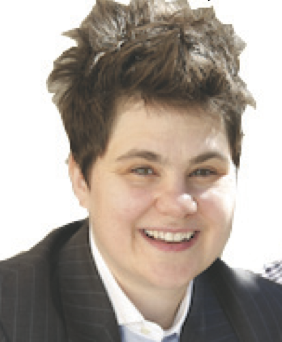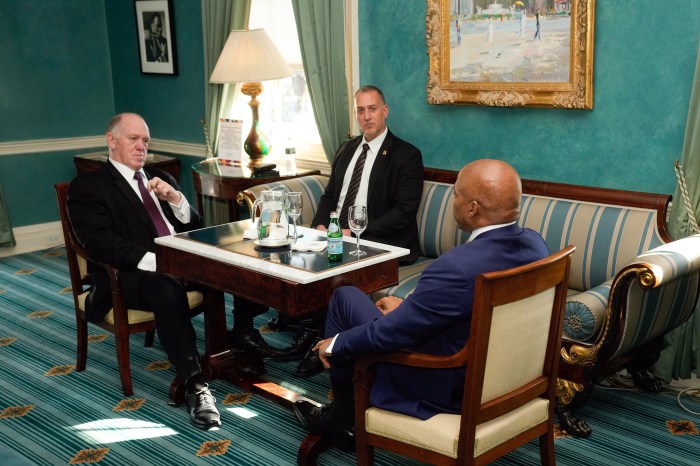
BY DUNCAN OSBORNE | Spend just 90 minutes with Yetta Kurland and she will describe herself many different ways. She is “a community activist, a civil rights attorney,” a “tenants’ rights attorney,” a “small business owner,” a “civil litigator” and “an educator.” These are only some of the titles that Kurland used in an interview last week with The Villager and its sister newspapers.
“I see myself as a reformer,” Kurland said. “I think that that’s what’s so important about my candidacy… . I’m willing to stand up to powerful interests, and I think I do so in a positive, solution-based way.”
Kurland is engaged in a particularly bitter race with Corey Johnson for the City Council seat that Speaker Christine Quinn has held for the past 14 years. The district is home to roughly 180,000 New Yorkers and ranges from 55th St. to Canal St. and from Fifth Ave. to the Hudson River.
This is Kurland’s second attempt to win the seat. In 2009, she challenged Quinn and won a respectable 31 percent of the vote in a three-candidate race in a very low-turnout Democratic primary.
“We had not expected to do as well as we did, but we had a really strong showing,” said the 45-year-old, Buffalo, N.Y., native.
Heading into this year’s Sept. 10 Democratic primary, which will effectively decide who wins the seat, Kurland has raised just under $140,000 in 943 separate donations. With city matching funds, her cash is very near the $168,000 maximum she can spend in the primary. Kurland’s signature issue is replacing the defunct St. Vincent’s Hospital and Medical Center, which is being converted to luxury condos by the Rudin Management Company.
“Job number one in City Council is to continue to fight to restore hospital services for the community,” she said. “This adversely impacts everyone in our community.”
But as much as Kurland is generous with descriptions of herself, she is stingy with specific answers as to how she will achieve any goals she articulates if she wins the City Council seat.
“I’ve been agnostic about how that happens, but I’ve offered several very real, very doable solutions,” the openly lesbian candidate said of replacing St. Vincent’s. “I’m very clear that this community needs a hospital.”
Separate from the Rudin residential redevelopment of the former main hospital campus, across Seventh Ave., North Shore-Long Island Jewish Health System is converting the former hospital’s O’Toole building into a 24/7, stand-alone emergency room and comprehensive care center. North Shore-L.I.J. is spending $100 million on the center and Rudin kicked in an additional $10 million. Not a full-service hospital, it will have only “two and a half beds,” Kurland said.
Kurland, though, gave the facility’s price tag as $139 million., and said they could build a 200-bed hospital there.
“For the same or similar costs they could put four to six more floors on there and that could be a small, 200-bed hospital,” she said.
The state Department of Health, which would have to approve a new hospital, opposes building such a facility there. Kurland would not say how she would overcome that resistance.
(Terry Lynam, a spokesperson for North Shore-L.I.J., told The Villager that the project’s cost, as far as they are concerned is still $110 million. As he described it, there will be two “medical surgical beds.”)
For 12 years, the Bloomberg administration has favored large-scale real estate projects. It is typical of these deals that the developers find reasons to not build the affordable housing, parks or other benefits that were promised to the local community. That has led to growing demands that the city’s approval process for such deals — the uniform land use review procedure, or ULURP — be reformed.
“When you talk about the ULURP process, it’s very amorphous and the devil is always in the details,” Kurland said. “What I would like to see is a way the exchange is more leveled, it’s more fair for the community, and it doesn’t create the types of problems we seeing in the ULURP process.”
ULURP begins at a community board, then gets approval from a borough president. The views of those two entities are advisory only. The City Planning Commission and the City Council have binding opinions. Would Kurland favor making the community board opinions binding?
“I’m open to that, I’m open to that as an idea,” she said. “It’s a conversation that I would like to hear from the community and I would have to think about.”
Kurland did take a specific shot, one of several, at Johnson who has held staff jobs at two real estate development firms.
“I think we need somebody who is not tied to real estate interests, who can be an independent voice, but can still work together with real estate with all parts of the community,” she said when discussing her candidacy.
Kurland touts her roots in the community, citing work she has done with the AIDS groups Housing Works and GMHC, her efforts to successfully enact marriage for same-sex couples in New York, and the legal cases she has brought that aided women and the L.G.B.T. community.
“I think that we need a strong, independent, progressive voice in City Council,” she said. “I think I’ve shown over the last two-and-a-half decades that I can stand up to some of the more powerful special interests in the community.”
The next City Council will have a new speaker and have to work with a new mayor, who will confront the aftermath of the gimmick Mayor Michael Bloomberg has used to balance the city’s budget — he has not negotiated new contracts with any of the city’s unions, saving billions in labor, pension and employee health insurance costs. The next mayor will have to fund new contracts on top of the budget gaps that are expected in the coming fiscal years. Every city councilmember who will want cash for projects could feel the pinch.
Kurland said that increased oversight by the City Council could find funds that are being misspent, and that paying city employees more could increase tax revenue.
“I do think that the way we re-stimulate an economy that’s having difficulty is we pay our workers a fair wage, and we make sure they have the money to buy a ticket to a Mets game or a Yankees game, or to buy some food at a local restaurant,” she said.
“I don’t see it as a drain of resources, I see it as a way of invigorating the economy.”
Kurland gave her most detailed responses when talking about her opponent, who has received the lion’s share of endorsements from the local politicians.
“I think this is a difference between continuing to have a top-down approach to leadership versus having somebody who is really is going to be from the community and fighting for the community,” she said. “If you want somebody who is just going to go along to get along and is just going to be part of the same trajectory we’ve seen over the last 10 or 15 years, I’m probably not you’re candidate.”





































